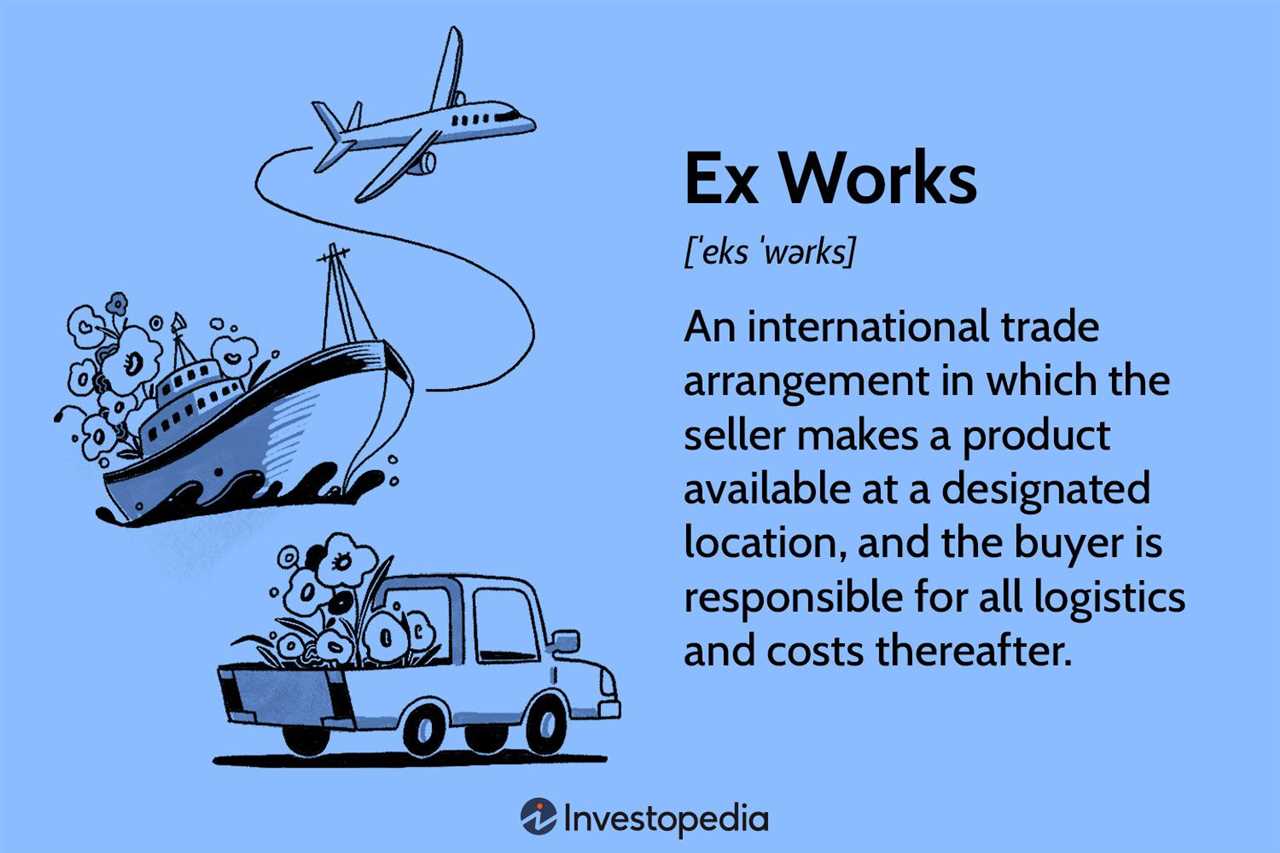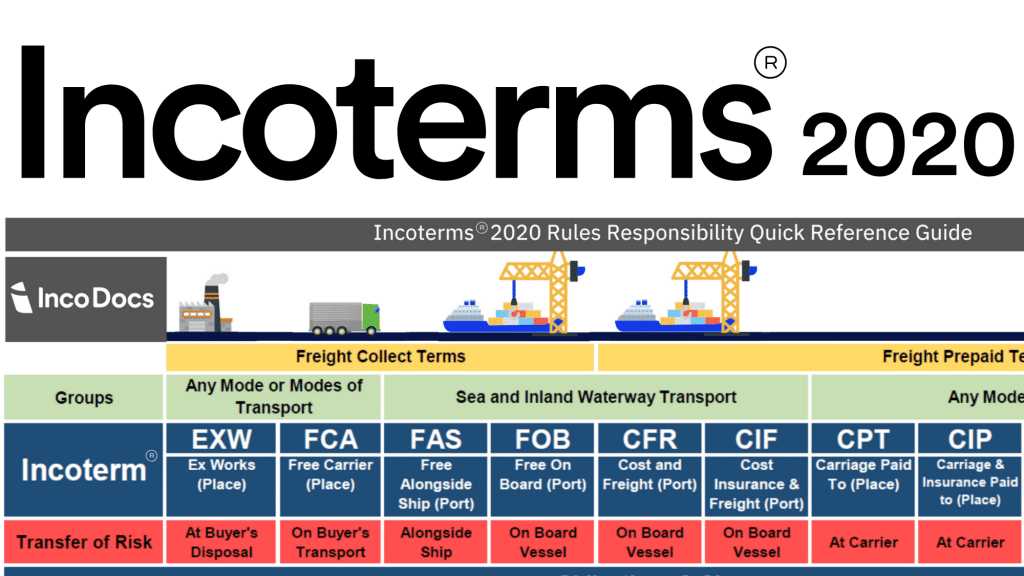Advantages of Ex Works (EXW)
Ex Works (EXW) is an international trade term that signifies that the seller’s responsibility for the goods ends at their premises, and the buyer is responsible for all subsequent transportation, customs clearance, and other related costs and risks. While this may seem like a disadvantage for the buyer, there are several advantages to using the Ex Works (EXW) Incoterm.
- Greater Control and Flexibility: One of the main advantages of Ex Works (EXW) is that the buyer has greater control and flexibility over the transportation and logistics process. They can choose their own shipping method, carrier, and schedule, allowing them to optimize their supply chain and meet their specific requirements.
- Cost Savings: Another advantage of Ex Works (EXW) is the potential for cost savings. Since the buyer is responsible for arranging transportation, they have the opportunity to negotiate better rates with shipping companies and choose the most cost-effective option. Additionally, the buyer can avoid paying any markup or handling fees that a seller might include in their price.
- Reduced Lead Time: With Ex Works (EXW), the buyer can take immediate possession of the goods once they are ready for collection. This eliminates the need to wait for the seller to arrange transportation and can significantly reduce lead time, allowing the buyer to receive the goods faster and potentially gain a competitive advantage.
- Customs Control: Ex Works (EXW) gives the buyer full control over the customs clearance process. They can choose their own customs broker and handle all necessary documentation and procedures themselves. This can be particularly beneficial for buyers who have experience and expertise in international trade and customs regulations.
- Opportunity for Quality Control: Since the buyer takes possession of the goods at the seller’s premises, they have the opportunity to inspect and verify the quality and condition of the goods before they are transported. This allows them to identify any issues or discrepancies early on and take appropriate action, such as requesting replacements or negotiating compensation.
Overall, Ex Works (EXW) offers several advantages for buyers, including greater control and flexibility, cost savings, reduced lead time, customs control, and the opportunity for quality control. However, it is important for buyers to carefully consider their capabilities and resources before choosing this Incoterm, as it requires them to take on additional responsibilities and risks.
Greater Control and Flexibility
One of the key advantages of the Ex Works (EXW) incoterm is the greater control and flexibility it provides to the seller. With EXW, the seller has complete control over the entire export process, from the packaging and labeling of the goods to the arrangement of transportation. This allows the seller to tailor the export process to their specific needs and requirements.
By having control over the packaging and labeling of the goods, the seller can ensure that the products are properly protected and labeled in accordance with the destination country’s regulations. This helps to minimize the risk of damage or loss during transit and ensures that the goods can be easily identified and cleared through customs.
Conclusion
Cost Savings
One of the key advantages of the Ex Works (EXW) Incoterm is the potential for cost savings. When using EXW, the seller is only responsible for making the goods available at their own premises. This means that the buyer is responsible for arranging and paying for all transportation costs, including loading the goods onto the transport vehicle.
In addition, by not having to bear the cost of transportation, the seller can offer the goods at a lower price. This can make the seller’s products more competitive in the market and attract more buyers. It also allows the seller to focus on their core business activities without the burden of managing transportation logistics.
Disadvantages of Ex Works (EXW)
While Ex Works (EXW) offers several advantages, it also comes with its fair share of disadvantages that businesses need to consider before choosing this Incoterm.
1. Increased Responsibility and Risk
One of the main disadvantages of Ex Works is that the seller bears minimal responsibility and risk once the goods are made available at their premises. The buyer is responsible for arranging transportation, insurance, and any necessary export documentation. This can be a burden for the buyer, especially if they are unfamiliar with international shipping processes and regulations.
Additionally, since the seller has no control over the transportation and handling of the goods after they leave their premises, there is an increased risk of damage or loss during transit. The buyer may have to bear the financial consequences of any such incidents.
2. Limited Control over Logistics
With Ex Works, the buyer has complete control over the logistics of the shipment, including choosing the carrier, arranging transportation, and handling customs procedures. While this can be advantageous for experienced importers who have established relationships with reliable logistics providers, it can be challenging for new or inexperienced buyers.
Without the seller’s involvement in the logistics process, the buyer may face difficulties in coordinating and tracking the shipment, especially if they are not familiar with the local regulations and requirements of the destination country.
3. Potential Delays and Additional Costs

Since the buyer is responsible for arranging transportation and customs clearance, there is a higher risk of delays and additional costs. The buyer may encounter unexpected challenges, such as customs inspections, documentation errors, or transportation issues, which can result in delays and additional expenses.
Furthermore, if the buyer fails to arrange transportation promptly, the goods may remain at the seller’s premises, leading to storage costs and potential penalties.
4. Lack of Buyer Protection

Ex Works places the majority of the responsibility on the buyer, leaving them with limited protection in case of disputes or issues with the goods. If the buyer discovers defects or damages after the goods have been collected from the seller’s premises, it can be challenging to hold the seller accountable.
Without clear contractual agreements and proper documentation, the buyer may face difficulties in seeking compensation or resolving disputes related to the quality or condition of the goods.
Overall, while Ex Works offers certain advantages, such as greater control and potential cost savings, it is essential for businesses to carefully consider the disadvantages and assess their capabilities and resources before opting for this Incoterm.
Disadvantages of Ex Works (EXW)
While Ex Works (EXW) offers several advantages, it also comes with a few disadvantages that businesses should consider before choosing this incoterm.
1. Increased Responsibility and Risk: Under the Ex Works (EXW) incoterm, the seller’s responsibility ends once the goods are made available at their premises. This means that the buyer bears the risk and responsibility for the entire transportation process, including loading the goods onto the vehicle, arranging for transportation, and handling any customs procedures. This can be a significant burden for the buyer, especially if they lack experience or resources in international trade.
2. Limited Control over the Shipping Process: With Ex Works (EXW), the buyer has limited control over the shipping process. They are responsible for arranging transportation and ensuring that the goods reach their destination safely and on time. This can be challenging, especially if the buyer is unfamiliar with the logistics and regulations of the destination country. It may also lead to delays or additional costs if the buyer encounters any issues during transportation.
3. Potential for Higher Costs: While Ex Works (EXW) can offer cost savings in terms of lower product prices, it can also lead to higher overall costs. The buyer is responsible for all transportation costs, including freight charges, insurance, customs duties, and any additional fees or taxes. These costs can add up quickly, especially if the buyer is shipping goods internationally or to remote locations.
4. Lack of Supplier Involvement: With Ex Works (EXW), the seller’s involvement in the shipping process is limited. They are only responsible for making the goods available at their premises, and they have no obligation to assist or provide guidance to the buyer. This lack of supplier involvement can be a disadvantage, especially if the buyer encounters any issues or requires support during the transportation process.

Emily Bibb simplifies finance through bestselling books and articles, bridging complex concepts for everyday understanding. Engaging audiences via social media, she shares insights for financial success. Active in seminars and philanthropy, Bibb aims to create a more financially informed society, driven by her passion for empowering others.
